|
Stay up-to-date on the latest PLIDA news!
May 19, 2021
 Pregnancy Loss and Infant Death Alliance (PLIDA) is proud to announce that IPBC 2022 Keynote Speaker Dr. Joanne Cacciatore's traumatic grief and compassion work at The Selah House Respite Center and Carefarm will be featured in The Me You Can't See - 2021 coming May 21st to Apple TV. From Oprah Winfrey and Prince Harry, this documentary series explores mental health and emotional well-being. Pregnancy Loss and Infant Death Alliance (PLIDA) is proud to announce that IPBC 2022 Keynote Speaker Dr. Joanne Cacciatore's traumatic grief and compassion work at The Selah House Respite Center and Carefarm will be featured in The Me You Can't See - 2021 coming May 21st to Apple TV. From Oprah Winfrey and Prince Harry, this documentary series explores mental health and emotional well-being.
“Now more than ever, there is an immediate need to replace the shame surrounding mental health with wisdom, compassion and honesty,” said Oprah Winfrey. “Our series aims to spark that global conversation.” We invite you to tune in and watch.
Congratulations to Dr. Cacciatore for this significant contribution to our lives and well-being!
Learn more: https://www.apple.com/tv-pr/news/2021/05/oprah-winfrey-and-prince-harry-to-premiere-the-me-you-cant-see-a-documentary-series-exploring-mental-health-and-emotional-well-being-on-may-21-on-apple-tv/
Press Release: PLIDA Congratulates IPBC Speaker and PLIDA Member on AJN Book of the Year Award
January 20, 2021
PLIDA would like to extend a heartfelt congratulations to Beth Perry Black, PhD, RN, FAAN for her 2020 American Journal of Nursing Book of the Year Award. We asked Dr. Black to include a message about this honor.
I am so pleased to receive the AJN Book of the Year Award, 1st place in Professional Issues category, for Professional Nursing: Concepts and Challenges, 9th edition (Elsevier). This book represents my initial foray into editing and publishing – and it came about in an unexpected way. In the early 2000’s, I was teaching a discipline of nursing course in the UNC at Chapel Hill BSN curriculum and ran across the third edition of this book while selecting a textbook for the course. I was drawn to the book because of its variety of topics. On the back cover, Kay Chitty, the original editor, included her email address, so I reached out to her with some questions about the organization of the chapters. I heard back from her in a few days, with a surprising note. She was beginning to plan for retirement and was looking for someone with whom to co-edit two editions before signing over rights to the book to the new editor. That turned out to be me! Kay had looked up my publications and liked my writing style. I joined Kay on the 5th edition, and by the 7th edition, I was on my own as sole editor of Professional Nursing.
The book keeps me anchored in the nursing profession. Updated every three years, my challenge is to stay current with issues in the field, and to anticipate where nursing is heading. In 2005, I would have never dreamed of content on “ethical use of social media”! I work hard to use inclusive language and to represent in photos and narrative the wide variety of persons who comprise this great profession. I have welcomed feedback from both faculty and students in striving to improve each new edition.
My experience in editing and publishing Professional Nursing opened the door to my very rewarding collaboration with PLIDA members and friends Rana Limbo and Patricia Wright in developing Perinatal and Pediatric Bereavement in Nursing and Other Health Professions (Springer), which in 2016 won the AJN Book of the Year, first place in Palliative Care category. My extensive experience in editing led me to the fulfilling role I hold now in the UNC School of Nursing, where my appointment is as the editor for the Office of Research Support and Consultation. I work with my colleagues in preparing their proposals for NIH and other funding sources, and their manuscripts for submission.
A chance email to a book editor over a decade ago opened the door to career opportunities I never envisioned! “Luck” is sometimes defined as “when opportunity meets preparedness.” I have been very lucky – and increasingly prepared – thanks to the painstaking mentoring I received from Kay Chitty, who taught me with patience and good humor. The book of the year award for Professional Nursing served to remind me of both my luck and my privilege in shaping how our future nurses understand nursing.
On behalf of the entire PLIDA board, staff, and perinatal bereavement community, we are honored to have such an amazing network of experts serving to enrich PLIDA’s mission.
About PLIDA:
PLIDA serves as leaders in perinatal and neonatal bereavement care. We do this through education, advocacy and networking for health care providers and parent advocates. We promote the highest quality of consistent evidence-based care for all families.
The Pregnancy Loss and Infant Death Alliance (PLIDA) has a unique purpose: to provide a formal network and a unified international presence to increase awareness and education focused on the emotional experiences and needs of bereaved families. PLIDA's goal is to be the central place for care giving professionals, parent advocates, members of the media and policy makers to share information on the professional care of families experiencing a perinatal loss. PLIDA also organizes the biennial International Perinatal Bereavement Conference.
PRESS RELEASE
Pregnancy Loss and Infant Death Alliance
P.O. Box 826
Castle Rock, CO 80104
January 8, 2021
Press Release: PLIDA Congratulates Board and PLIDA Members on AJN Book of the Year Award
PLIDA would like to extend a heartfelt congratulations to Dr. Rana Limbo, Dr. Charlotte Wool, and Dr. Brian Carter for their 2020 American Journal of Nursing Book of the Year Award.
Handbook of Perinatal and Neonatal Palliative Care: A Guide for Nurses, Physicians, and Other Health Professionals has been awarded the 2020 AJN Book of the Year Award in two categories - maternal-child health/prenatal nursing/childbirth and palliative care and hospice. The awards are published in the January 2021 issue of the American Journal of Nursing.
The book was edited by 2022 International Perinatal Bereavement Conference plenary speakers, Rana Limbo, PhD, RN, CPLC, FAAN, Charlotte Wool, PhD, RN, and Brian S. Carter, MD, FAAP. In addition, the book has contributions from several other IPBC plenary speakers, multiple concurrent speakers, board and PLIDA members.
This is not the first time the AJN award has been awarded for books edited by Dr. Rana Limbo and other PLIDA experts. The following have also been recognized as Books of the Year: Perinatal and Pediatric Bereavement in Nursing and Other Health Professions (2016; Beth Black, Patricia Moyle Wright, & Rana Limbo, Eds.); Guided Participation in Pediatric Nursing Practice: Relationship-Based Teaching and Learning With Parents, Children, and Adolescents (2018; Karen F. Pridham, Rana Limbo, & Michele M. Schroeder, Eds.).
Published by Springer Publishing Company, Handbook of Perinatal and Neonatal Palliative Care, is available for purchase on https://www.springerpub.com/handbook-of-perinatal-and-neonatal-palliative-care-9780826138392.html.
On behalf of the entire PLIDA board, staff, and perinatal bereavement community, we are honored to have such an amazing network of experts serving to enrich PLIDA’s mission.
About PLIDA:
PLIDA serves as leaders in perinatal and neonatal bereavement care. We do this through education, advocacy and networking for health care providers and parent advocates. We promote the highest quality of consistent evidence-based care for all families.
The Pregnancy Loss and Infant Death Alliance (PLIDA) has a unique purpose: to provide a formal network and a unified international presence to increase awareness and education focused on the emotional experiences and needs of bereaved families. PLIDA's goal is to be the central place for care giving professionals, parent advocates, members of the media and policy makers to share information on the professional care of families experiencing a perinatal loss. PLIDA also organizes the biennial International Perinatal Bereavement Conference.

22nd International Perinatal Bereavement Conference - UPDATE
Thank you for your patience as we continued to monitor COVID-19 and its impact on our world and the way we function day to day. Over these last months PLIDA has been in contact with the Drake Hotel Chicago to assess their and our ability to host an in person conference. Although things were improving and restrictions were beginning to lift, that changed recently.
With the significant increase in COVID-19 cases, hospitalizations, reimplementation of restrictions and the vaccine distribution time line, we determined it is not feasible to host an in person conference in May 2021.
That said we have exciting news. The IPBC has been moved forward to October 12-15, 2022 in Denver, Colorado. Denver in the fall is stunning and by 2022 many of the current constraints will be lifted. We anticipate that we can host the type of conference we have all come to expect. One based on quality research, best practice information, relationship and learning together in a beautiful setting.
We are extending an invitation to all of the speakers both plenary and session, that were slated for Chicago, to present in Denver as they were strong and offered vital information that impacts our clinical practice and how we best care for our families. Those of you who were registered will have several options to consider. Over the next several weeks we will reach out to each of you both, speakers and registrants with the options available and the process moving forward.
Those of you who are recipients of a scholarship will retain your scholarship opportunity in Denver. As Chicago is an amazing city with much to offer our participants, will return to Chicago and the beautiful Drake Hotel in 2024. The Drake will be back in its glory with the tearoom bustling once again and all the energy of this wonderful city will be back for us to explore and enjoy.
Please be watching your email in early January for more information related to this change. Thank you again for your patience and support of PLIDA.
Best,
Gina Leigh Jones, RN, CPLC
PLIDA President
October is Pregnancy and Infant Loss Awareness Month. While 1 in 4 pregnancies end in a loss, many still suffer in silence. PLIDA’s mission is to promote the highest quality of consistent, evidence-based perinatal bereavement care for all families who experience the tragic loss of a baby. We express this mission by providing continuing education and the resources that care providers and parent advocates need to provide comprehensive and compassionate care to the families they serve.
To support those who care for bereaved families, please consider a donation of any amount. Every dollar counts toward helping PLIDA create a world-class conference, award scholarships, and provide resources and support to the professionals doing the critical work of caring for grieving families.

Pregnancy Loss and Infant Death Alliance - Statement (August 14, 2020)
Black Lives Matter
Dear PLIDA members:
The organization is presenting three diverse pieces in the newsletter that are united in one theme: They make the case for how African Americans have been hurt professionally and as patients by discrimination based on the color of their skin. These materials underpin the statement on racism written by board member and neonatologist, Dr. Terri Major Kincade. The statement can be found on the PLIDA website and was published on August 14, 2020.
The three printed pieces include a story about journalist Bakari Sellers and his wife Ellen Rucker on racism in health care, and an apology from the American Academy of Pediatrics about the opposition the organization's first two Black physicians faced when they attempted to become members. Finally, the article cited below, along with its abstract, published in 2019, summarizes research findings that show Black women who decline procedures during childbirth express being given "poor treatment." Specifically,"...women pay a penalty for exhibiting behavior that may be perceived as uncooperative, and this penalty may be greater for Black women."
As the only perinatal bereavement member organization in the US, the Pregnancy Loss and Infant Death Alliance believes that we must keep our members apprised of how systemic racism has cost many of our patient’s quality care and even their lives. PLIDA believes that education is the key to a future of equality, compassion, and awareness, especially for people of color. We also believe that all lives will matter when black lives matter. To that end, we extend our mission through ongoing communication with members, taking a stand to promote social justice, and adding these topics as key ingredients to our upcoming biennial conferences. All families regardless of their race or ethnicity have a right to expect to be cared for with best practices, compassion and humility.
Pregnancy Loss and Infant Death Alliance - Statement (July 10, 2020)
Black Lives Matter
During our last IPBC conference we opened with a keynote addressing the legacy of loss in the African American community and how this legacy may inhibit our efforts as bereavement professionals to create safe spaces to honor the grief of marginalized populations. Little did we know two years ago where we would be today. Following that keynote address, PLIDA moved forward to establish a new committee to address Health Equity, Diversity, and Inclusion (HEDI) in the areas of Pregnancy and Infant Loss. It is the desire of the board that PLIDA as an organization continue to be a leader in two specific ways. The first is describing and providing evidence-based perinatal bereavement care for all families who experience the death of a baby. The second is using PLIDA as a place to highlight, learn, and ameliorate gaps that may exist in providing comprehensive care with respect to race, gender, creed, and religion. We join our nation in the collective sigh, Enough is Enough.
As we move forward our hearts are heavy, but our resolve is strong as we promise to make a commitment to real change in diversity and inclusion within our body and within our communities. In an effort to ignite this change we offer this call to action and challenge each member to evaluate their programs and ways they can make a tangible difference. Our ultimate goal is to be a part of the solution and not an agency of the problem.
- Consider the populations you serve. Are there ways to increase diversity for your programs? Are there families of color who have experienced loss that have elected not to use your programs? Have you followed up as to why? How does what is happening now connect to mistrust of our programs? We recommend you watch Trevor Noah: The Broken Social Contract: https://www.youtube.com/watch?v=v4amCfVbA_c
- Create safe spaces for your communities of color to share their grief and recognize that this is a part of a series of instances of grief on top of grief. This requires intentional work and collaborative discussion. More listening than talking. Anti-racism reading list and resources: https://docs.google.com/document/d/1BRlF2_zhNe86SGgHa6-VlBO-QgirITwCTugSfKie5Fs/preview?pru=AAABcrngt2A*L96Vhqd_7c6m89FzRMv-dg
- Educate yourself on the Black Lives Matter Movement, take a moment to actually read the collaborative goals of the organization, which was ignited by the death of Trayvon Martin. All lives cannot matter until Black Lives Matter. https://blacklivesmatter.com/
- Consider the following resources to understand what it means to be an ally, to be intentionally anti-racist. It is not enough to be not racist. If you see something say something. We are all going to have to become a little more uncomfortable to make true change. Silence is not acceptable. https://bethebridge.com/
https://www.embracerace.org/
- Is their bias in the way your programs enroll patients, follow up with patients, or observed instances where caregivers have judged the way patients manifest their grief or loss? If so, consider how to improve this beginning with cultural humility to include authentic conversations around racism. Understand that just by virtue of being in the United States our systems are imbued with systematic bias both implicit and explicit and this impacts the way we deliver care
https://nmaahc.si.edu/about/news/national-museum-african-american-history-and-culture-releases-talking-about-race-web?fbclid=IwAR3otgVraGL_UHLFjtaApzvz8Ta1cw_qLwpDb1TW5btaJb4dfYXaSuxBgxM
PLIDA offers these five points, detailing resources for promoting self-awareness and transformation. PLIDA’s Health Equity, Diversity, and Inclusion committee (HEDI), chair Terri Major-Kincade, MD, would like to hear from you and your experiences to better guide their work to improve care for all families.
Through this project to make Black lives matter; we aim to make a difference in this international movement to fight racism. The goal is that by opening our hearts and minds, we will understand more fully what it means to be inclusive.
Pregnancy Loss and Infant Death Alliance - Statement (June 9, 2020)
Black Lives Matter
Today is George Floyd's funeral where he will be laid to rest next to the mother he cried out to.
As an international organization committed to the support of bereaved families PLIDA understands the sound of collective grief. It is a sound that is simultaneously silent and deafening. Our members know what it is like to grieve in silence yet want to be heard. Our members know what it is like to suffer unimaginable pain in the loss of a child, and the toll that takes on family members. Our members know what it is like to desire allies for a problem that for many remains invisible, the pain of pregnancy and infant loss. It is through this lens, the lens of loss that PLIDA joins our nation in mourning the death of George Floyd, Breonna Taylor, and Ahmaud Arbery. Each died through a series of events stemming ultimately from the impact of systemic racism. It is through the lens of loss that PLIDA unequivocally supports the Black Lives Matter movement and calls for a systematic approach to ending police brutality. It is not enough for us to merely not be racist, but we must actively endeavor to be anti-racist. This will require more dedicated advocacy on behalf of the families we serve, bereaved families who may be voiceless at a time when we can be their voice in our respective organizations and institutions.
George Floyd’s final words that included “I can’t breathe” and “Mama, Mama”, is even more poignant when one considers how much we as an organization discuss the last breath in our perinatal hospice and bereavement support programs and the fact that Mr. Floyd’s mother has been deceased many years. In his words we are reminded of every mother who has lost a child and particularly mothers of color who are more likely to die in childbirth, more likely to experience a poor birth outcome and black men and black boys who have a higher likelihood of dying at the hands of police. There is no bereavement support for this kind of loss and our hearts ache along with the hearts of a community that has held this heartbreak for over 400 years. We want you to know that we see you. We grieve with you. We are devastated with you. As PLIDA Members, let us be on the side of the history that says” No more”. This is the legacy of loss we meet when seeking to align with our communities of color. This is the legacy we would like to be a part of dismantling. This is a legacy we can change by evaluating our own biases, in our own organizations and institutions and the way we provide bereavement care to our incredibly special and unique populations.
Please reflect on the words and ideas in this post. In future writing, we will guide and reflect with you on what we can do… as individuals, as family advocates, and through our organizations and institutions. We won’t stop here. We can’t.
New Guide for Nurses, Physicians, and Other Health Professionals Released!
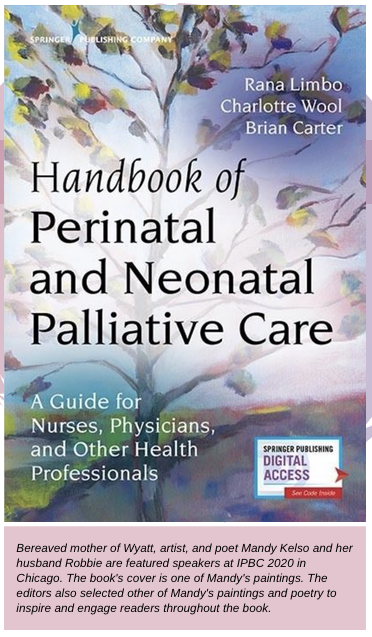 On behalf of the PLIDA Board of Directors, congratulations to many PLIDA members and IPBC speakers on the release of "Handbook of Perinatal and Neonatal Palliative Care: A Guide for Nurses, Physicians, and Other Health Professionals." Editors of this resource include: On behalf of the PLIDA Board of Directors, congratulations to many PLIDA members and IPBC speakers on the release of "Handbook of Perinatal and Neonatal Palliative Care: A Guide for Nurses, Physicians, and Other Health Professionals." Editors of this resource include:
- Rana Limbo PhD, RN, CPLC, FAAN
- Charlotte Wool PhD, RN
- Brian Carter MD, FAAP
All three editors and Dr. Kathie Kobler, author of the inspiring closing chapter, have been invited to join a plenary panel discussion on perinatal and neonatal palliative care at IPBC 2020 in Chicago!
From the Foreword:
The Handbook of Perinatal and Neonatal Palliative Care is an extraordinarily comprehensive and well-written volume that should be read by every clinician caring for pregnant women and newborns. The case-oriented format of each chapter makes the volume readable and also useful as a resource in complex situations. The book spans all aspects of the clinical and compassionate care of patients, families, and caregivers. Written by experts from all clinical disciplines, including medical and surgical physicians, mental health professionals, nurses, therapists, and chaplains, it shows great respect for and gives voice to affected families and their babies.
Key Features:
- Provides comprehensive and authoritative knowledge from recognized leaders in the field
- Addresses a growing need for specific provider resources in neonatal palliative care
- Covers the clinical and emotional aspects of palliative care for babies and their families
- Lists abundant resources for effective and compassionate family-centered care
- Provides case studies with critical thinking questions
- Includes accompanying video clips of healthcare and family interactions
The following plenary speakers for 2020 have at least one chapter in the book: Beth Perry Black, Kathie Kobler, Marianne Hutti, Meghaan Nguyen, Brian Carter, Charlotte Wool, Rana Limbo. I've attached the book's table of contents as a piece of information. You'll see others listed who have been or are PLIDA leaders. We also have a group of perinatal and neonatal physicians that represent the most prolific researchers and writers in the field.
The book is available for pre-order from Springer Publishing Company. Take a look at the Table of Contents below!
Table of Contents (click here to view as a PDF)
Foreword Jacqueline M. McGrath
Preface Rana Limbo, Charlotte Wool, Brian Carter
SECTION 1: UNDERSTANDING PALLIATIVE CARE
Chapter 1. Advancing Palliative Care to Perinatal and Neonatal Settings - Charlotte Wool and Beth Perry Black
Chapter 2. Neonatal and Perinatal Palliative Care Services and Programs - Steven R. Leuthner and Emilie Lamberg Jones
Chapter 3. Creating Seamlessness in Palliative Care Services - Sara Munoz-Blanco, Sue Huff, Renee D. Boss, and Christy Torkildson
SECTION 2: CARING FOR THE WHOLE FAMILY IN PALLIATIVE CARE
Chapter 4. Comfort in Perinatal and Neonatal Palliative Care: An Innovative Plan of Care Focused on Relational Elements - Elvira Parravicini and
Francis T. McCarthy
Chapter 5. Suspending Judgment: Being With and Knowing the Family - Terri Major-Kincade, Leslie L. Harris, and Stacy C. Smith
Chapter 6. Helping Siblings Connect, Relate, and Say Goodbye - Meghaan R. Nguyen
Chapter 7. Barriers to Referring Patients for Perinatal Palliative Care - Barthélémy Tosello and Marie-Ange Einaudi
SECTION 3: PLANNING AND DECISION MAKING
Chapter 8. Communicating Devastating News - Steven R. Leuthner, Renee D. Boss, and Brian S. Carter
Chapter 9. Grief and Memories Begin with Diagnosis - Rana Limbo and Marie Walter
Chapter 10. Anticipatory Guidance: Birth and Advance Care Planning - Jessica T. Fry, Natalia Henner, and Andrea Caruso
Chapter 11. Difficulty in Predicting Survival: Genetics and Genetic Counseling - Martha Dudek and Rebecca D. Carter
Chapter 12. “Compatible with Love”: Qualitative Analysis of Decision-making Rationale of Parents Who Continue a Pregnancy Affected by a Life-limiting
Fetal Condition - Jesse Wool and Charlotte Wool
Chapter 13. Perinatal Regoaling in the Face of Serious Illness: Hopeful Thinking, Good-Parent Beliefs, and Uncertainty - Douglas L. Hill,
Jackelyn Y. Boyden, Chris Feudtner, David A. Munson
Chapter 14. Building and Sustaining Relationships During Pregnancy - Amy Kuebelbeck
SECTION 4: PHYSICAL ASPECTS OF PALLIATIVE CARE: DIAGNOSIS, TREATMENT, AND OUTCOMES
Chapter 15. Attending to Pain and Suffering in Palliative Care - Marc-Antoine Marquis and Antoine Payot
Chapter 16. Managing Pain and Discomfort in the Mother - Steven D. Waldman, Melissa Liddle, Reid A. Waldman, and Kelly L. Sharp
Chapter 17. Perinatal Palliative Care in the Context of Fetal or Neonatal Surgery - David A. Munson
Chapter 18. Palliative Care at the Time of Unexpected Premature Delivery - Lezlie Andersen, Bethany D. Kaemingk, and Christopher A. Collura
Chapter 19. Compassionate Extubation and Withdrawal of Life-Sustaining Therapies - Jennifer Linebarger and Meghan Tracewski
SECTION 5: SUPPORTING FAMILIES AND CARE PROVIDERS THROUGH THE NUANCES OF PALLIATIVE CARE
Chapter 20. Lactation and Breastfeeding in the Context of Perinatal Palliative Care - Diane L. Spatz and Joanna C. M. Cole
Chapter 21. Ten Ethical Principles for Neonatal Palliative Care - Franco Carnevale, Jacqueline van Wijlen, and Brian S. Carter
Chapter 22. Spirituality: The Effects of Another’s Pain and Suffering on Care Providers - Darryl I. Owens and Hadley Kifner
Chapter 23. Assessing Perinatal Grief Intensity in the Palliative Care Setting - Marianne H. Hutti and Lela A. Baker
Chapter 24. Strategies to Honor Professional Well-Being in Perinatal and Neonatal Care - Kathie Kobler
Appendix
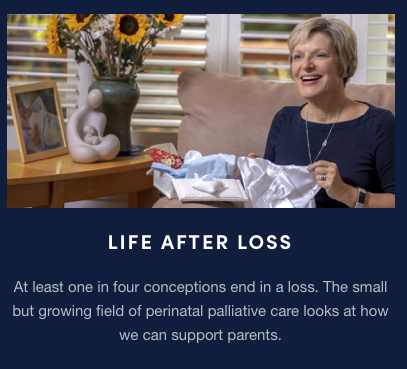 Denise Côté-Arsenault, PhD, RN, FNAP, FAAN is featured in the UNC Greenboro Spring 2019 Research Magazine in an article titled "Life After Loss." Denise Côté-Arsenault, PhD, RN, FNAP, FAAN is featured in the UNC Greenboro Spring 2019 Research Magazine in an article titled "Life After Loss."
Dr. Côté-Arsenault is a PLIDA board member and past IPBC plenary speaker.
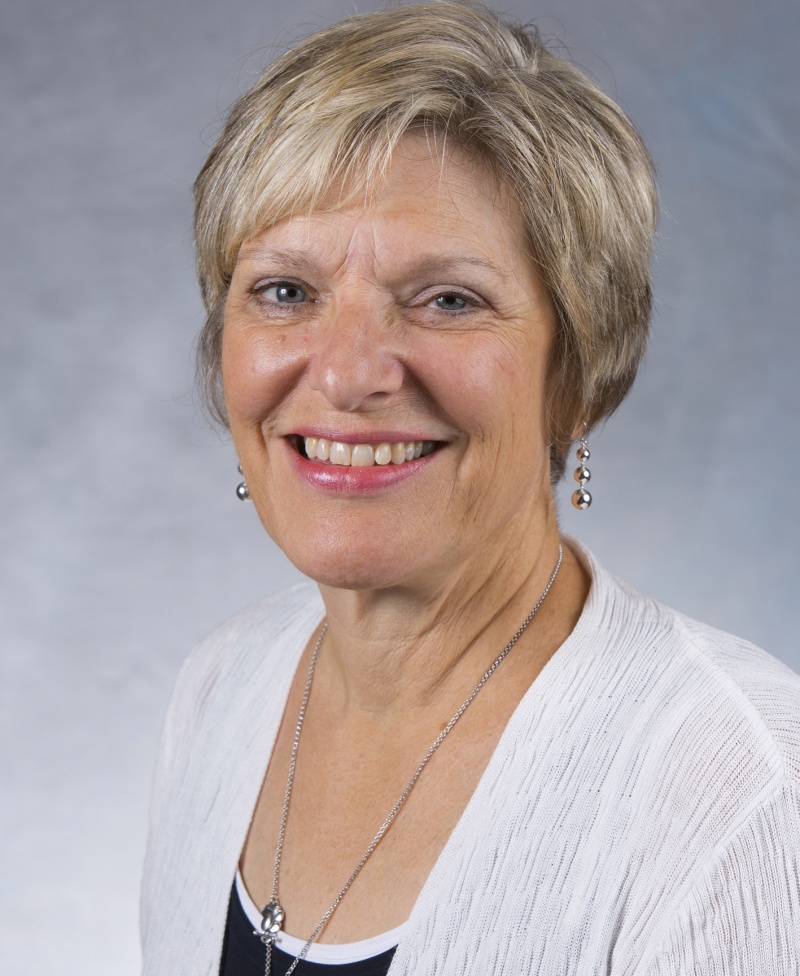
Hear Dr. Denise Côté-Arsenault on perinatal palliative care at ISA2019 Madrid
PLIDA's Board Member, Dr. Denise Côté-Arsenault, will give a keynote talk on perinatal palliative care at ISA2019. Dr.Côté-Arsenault, who has a PhD in nursing from University of Rochester, is the Eloise R. Lewis Excellence Professor of Nursing at the University of North Carolina Greensboro, USA.
Read more: https://www.isa2019madrid.com/hear-dr-denise-cote-arsenault-on-perinatal-palliative-care-at-isa2019-madrid/?fbclid=IwAR1iHcBBZZp4UNfqE86ahoSrD9RbYGtKgVxztKz0oNfGsQq55dU1tXCO8Lo
Announcement: PLIDA Members Published in National Journal
Congratulations to Rana Limbo, PhD, and Marie Walter, RN, who were recently published in MCN, The American Journal of Maternal/Child Nursing.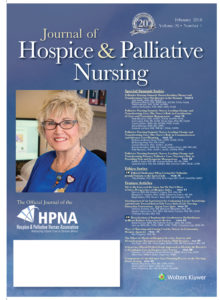
Rana, PhD, RN, CPLC, FAAN, is senior consultant and associate director of Resolve Through Sharing (RTS). Rana is the past president of PLIDA.
Marie, MS, RN, C-EFM, CPLC, is lead educator and advance practice nurse, RTS. Marie is a PLIDA member, and an IPBC 2018 preconference and concurrent presenter.
Marie’s co-authored contribution, “Clinical Aspects of Miscarriage” and Dr. Limbo’s co-authored contribution, “Respectful Disposition after Miscarriage: Clinical Practice Recommendations” appear in the January-February special topics series on miscarriage.
“Marie’s article on the clinical aspects of miscarriage was selected to be published ahead of print,” Dr. Limbo says. “Additionally, the article was selected for reader continuing education credit.”
Dr. Limbo’s article was also selected to be published ahead of print. Additionally, she served as the guest editor, publishing an editorial titled “Miscarriage.” These things highlight the contribution Resolve Through Sharing® (RTS) makes to the professional world, affecting practice and patient experience far and wide.
While perinatal loss through miscarriage has been a central component of RTS education since its beginning in 1981, national and international attention to the impact of these losses and the need to improve care standards has recently been elevated. It is estimated that 777,000 miscarriages occur in the U.S. each year. Seen as a leader on the bereavement education front, RTS has responded by creating a miscarriage-specific educational opportunity that can serve as a stand-alone or complement to its existing trainings.
“These scholarly articles are especially important as RTS has recently launched a miscarriage-focused initiative we call It’s Never Too Early™ (INTE),” says RTS director Mary Beth Hensel, MBA. “It was premiered at our annual La Crosse National Training event last summer. We have been working with a Gundersen taskforce to review bereavement standards systemwide to identify gaps in care. Miscarriage, particularly occurring in the emergency department, has been flagged as an area where patients would benefit from an expanded application of RTS practice standards.”
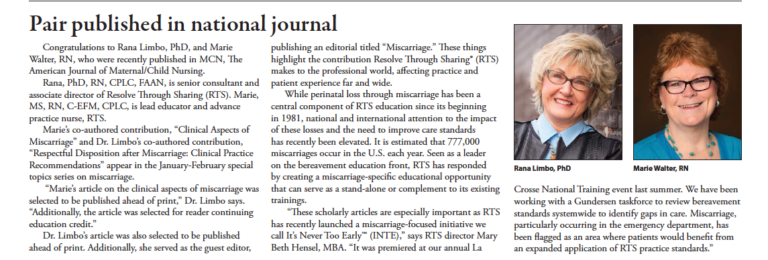
PLIDA's Past President Awarded Lifetime Distinguished Service Award - Humanitarian Category
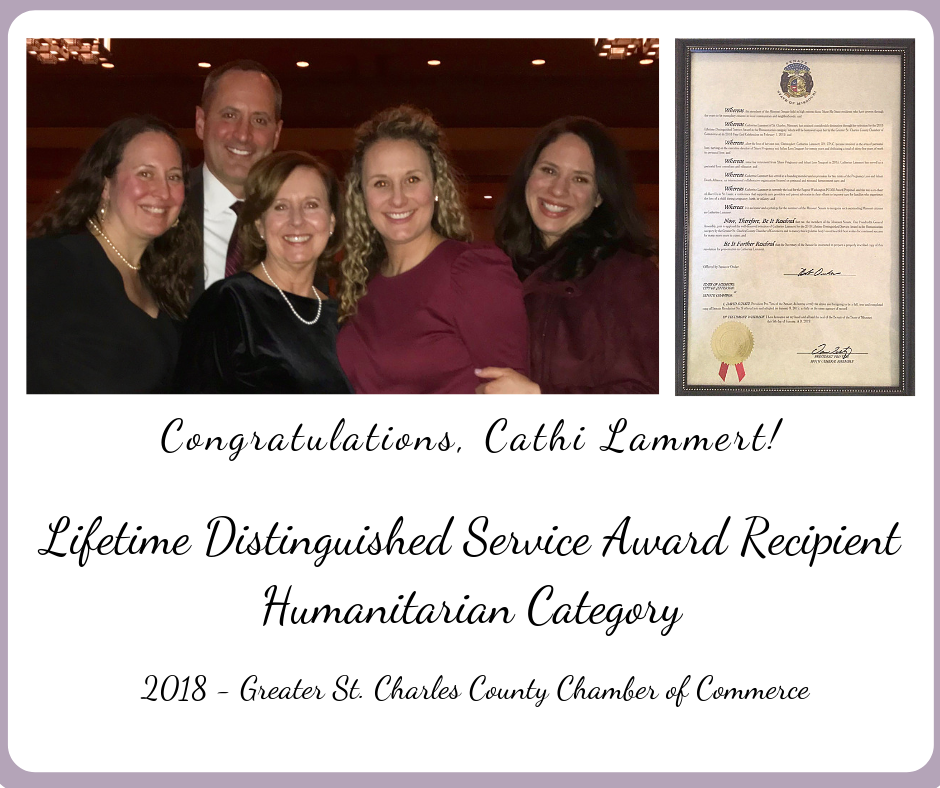
On behalf of the PLIDA Board, we would like to congratulate PLIDA's past president, Cathi Lammert on an amazing honor! Last weekend Cathi was recognized with a Lifetime Distinguished Service Award - Humanitarian Category from the Greater St. Charles County Chamber of Commerce.
Cathi's decades of leadership, love and passion for both Share Pregnancy & Infant Loss Support and PLIDA has given support to care providers and parent advocates while continually improving care for families who experience loss during pregnancy, birth or infancy.
Cathi continues to touch the lives of so many, and we are grateful for her contributions and passion within the perinatal bereavement community. Congratulations Cathi!
Announcement: Excellence in Leadership Award
Congratulations to Dr Rana Limbo on her Award for Excellence in Leadership by the Association of Women's Health, Obstetrics and Neonatal Nurses (AWHONN). Dr Limbo was recognized for her nearly 50 year nursing career and her extensive contributions to Perinatal Bereavement Support through Resolve Through Sharing and PLIDA.
Wisconsin Nurse Receives National Nursing Association’s Excellence Award
Dr. Rana Limbo Accepts AWHONN Award for Leadership
The Association of Women’s Health, Obstetric and Neonatal Nurses (AWHONN) today presented its 2017 Award of Excellence in Leadership to Rana Limbo, PhD, RN, CPLC, FAAN, for her near 50-year nursing career for her internationally renowned perinatal bereavement program, Resolve Through Sharing. The award was presented at the AWHONN national Convention in New Orleans, LA. Continue reading: http://www.awhonn.org/news/351811/Dr.-Rana-Limbo-Accepts-AWHONNs-Award-of-Excellence-in-Leadership.htm#.WWQdaDksaQV.facebook
|
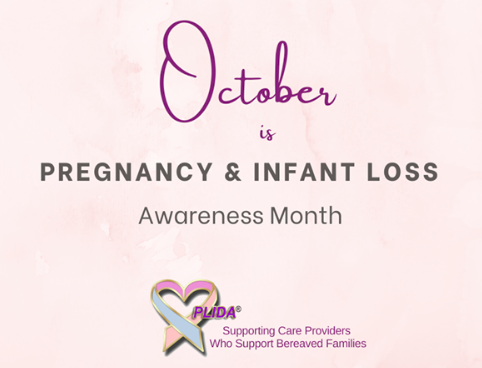





 On behalf of the PLIDA Board of Directors, congratulations to many PLIDA members and IPBC speakers on the release of "Handbook of Perinatal and Neonatal Palliative Care: A Guide for Nurses, Physicians, and Other Health Professionals." Editors of this resource include:
On behalf of the PLIDA Board of Directors, congratulations to many PLIDA members and IPBC speakers on the release of "Handbook of Perinatal and Neonatal Palliative Care: A Guide for Nurses, Physicians, and Other Health Professionals." Editors of this resource include: Denise Côté-Arsenault, PhD, RN, FNAP, FAAN is featured in the UNC Greenboro Spring 2019 Research Magazine in an article titled "Life After Loss."
Denise Côté-Arsenault, PhD, RN, FNAP, FAAN is featured in the UNC Greenboro Spring 2019 Research Magazine in an article titled "Life After Loss." 


